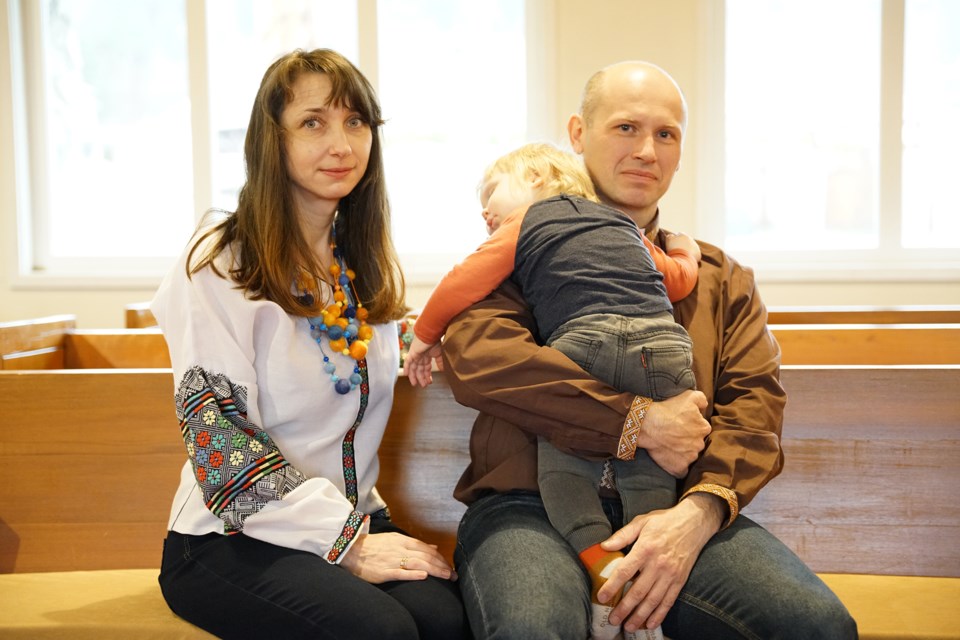With conflict raging in Ukraine, a qathet region couple with deep roots in the country are concerned for family and friends.
Taras Pakholchuk and his wife Halyna were both born in Ukraine, with Taras coming to Canada to live with his mother when he was just shy of his 17th birthday, on June 27, 1999. Halyna is a recent newcomer to Canada, having lived in qathet for nearly three years. The couple, who have a 14-month-old son named Adam, met long-distance through relatives in Ukraine.
“We started talking, first on the phone and then by video chat,” said Taras. “Then, we met in Europe and then we got engaged. Then, we came to Canada. For about a year we were long distance.”
Both Taras and Halyna have family in Ukraine. Halyna has a number of friends still there.
Taras said they both have grave concerns for family and friends. Halyna said she is keeping in touch on a daily basis, mostly through text messaging, because there is a 10-hour time difference between here and Ukraine.
“I’m worried about them,” added Halyna.
She said thankfully, her family lives in western Ukraine, away from most of the conflict. Even in western Ukraine, however, those she cares about have been going to shelter because they don’t know what is going to happen when the sirens sound. Halyna said bombs have fallen on an airport close to her family’s home.
She is in touch with those she cares about on a daily basis because she wants to make sure they are safe.
Taras said those they are in contact with are very worried.
“Everyone feels the tension,” he added.
Halyna said she feels so sad about the situation in Ukraine. Beyond the human tragedy, she said vast tracts of infrastructure have been destroyed. Many of the buildings that are gone were historically significant, she indicated.
“In all these towns, there were treasures,” said Halyna. “This is a tragedy for the loss of people’s lives. It is a loss of so much heritage, culture and a way of life. Ukraine was a beautiful country. Everything and everyone matters. It is a sad time.”
Taras said the conflict has been going on since 2014, when Russian president Vladimir Putin ordered the annexation of Crimea, and this has escalated now.
When the Russians first started exercising their designs on the eastern portion of Ukraine, Taras said he was focused on the news and really worried, calling relatives and trying to find out what was happening. He said he was cross-referencing various information sources to try to get to the truth.
Fog of war
“This is the fog of war; everyone has their own story and their own spin,” said Taras. “At that time I looked at everything that was happening and I realized I have no power. I could have completely neglected my life here in Canada and gone back there and got involved. I had to choose to limit my exposure to what’s happening in Ukraine and focus on my life here in Canada.
“Over the years I have become a little bit more numb. While I’m fully aware of what’s happening in Ukraine, I’m not as involved in it. There are people suffering, and at the same time, I have to also focus on work and the things we have to do in life with our family here.”
Taras said from what he is able to discern, the western part of Ukraine is starting to get back into its routines. He said citizens are trying to support the war effort and are donating money towards the conflict. Ukrainians are united in their culture and their heritage, and they are trying to defend their land, he added.
“There is definitely a resistance,” said Taras. “Putin has been saying he would come in and liberate Ukrainians, but I’m not sure what kind of intelligence he’s been getting. I think it was faulty intelligence. Looking at the Ukraine and Russian relationship, if I can draw a comparison, it’s like England and France. In history, there has been a 100-year war, and England would often speak negatively of France and vice versa.
“That’s the kind of dynamic that’s happened between Ukraine and Russia. European countries, however, have learned to cooperate and coexist for a long time, whereas in Ukraine, there is the unresolved question because it got independence from the former Soviet Union. It’s only been 30 years so it’s still fresh and still developing. There’s a lot that is unresolved.”
Taras said part of the reason Russia does not let go of the Ukrainian eastern provinces is because a lot of the factories there were built by the Soviet Union and are building parts for the Russian military.
“They can’t let it go simply because they depend on those parts,” said Taras. “With Crimea, it’s [Russia’s] port for their military fleet, so they wouldn’t let it go as well. There’s a connection there that’s hard to break.”
Deep roots
Taras said he still has nostalgic feelings for Ukraine, but when he and Halyna arrived together in Vancouver, he felt like he was home.
“We have family in Ukraine and I have memories where Halyna and I were in Lviv and Kyiv and there is a connection there, and inevitably, that’s where our roots are,” said Taras.
He said Canada is welcoming refugees but everyone they have spoken with in Ukraine is not in a position to leave. He said young mothers with their children don’t want to leave without their husbands, who are military-bound.
Halyna said they don’t want to leave their homes.
“My friend doesn’t want to go,” said Halyna. “She loves her home. She can’t move.




